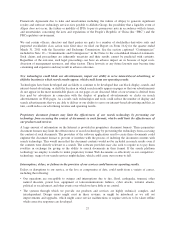Yahoo 2011 Annual Report Download - page 22
Download and view the complete annual report
Please find page 22 of the 2011 Yahoo annual report below. You can navigate through the pages in the report by either clicking on the pages listed below, or by using the keyword search tool below to find specific information within the annual report.legal services, can be unclear. Internationally, we may also be subject to laws regulating our activities in foreign
countries and to foreign laws and regulations that are inconsistent from country to country. We may incur
substantial liabilities for expenses necessary to defend such litigation or to comply with these laws and
regulations, as well as potential substantial penalties for any failure to comply. Compliance with these laws and
regulations may also cause us to change or limit our business practices in a manner adverse to our business.
A number of U.S. federal laws, including those referenced below, impact our business. The Digital Millennium
Copyright Act (“DMCA”) is intended, in part, to limit the liability of eligible online service providers for listing
or linking to third-party Websites that include materials that infringe copyrights or other rights of others. Portions
of the Communications Decency Act (“CDA”) are intended to provide statutory protections to online service
providers who distribute third-party content. We rely on the protections provided by both the DMCA and the
CDA in conducting our business. If these or other laws or judicial interpretations are changed to narrow their
protections, or if international jurisdictions refuse to apply similar provisions in foreign lawsuits, we will be
subject to greater risk of liability, our costs of compliance with these regulations or to defend litigation may
increase, or our ability to operate certain lines of business may be limited. The Children’s Online Privacy
Protection Act is intended to impose restrictions on the ability of online services to collect some types of
information from children under the age of 13. In addition, Providing Resources, Officers, and Technology to
Eradicate Cyber Threats to Our Children Act of 2008 (“PROTECT Act”) requires online service providers to
report evidence of violations of federal child pornography laws under certain circumstances. Other federal, state
or international laws and legislative efforts designed to protect children on the Internet may impose additional
requirements on us. U.S. export control laws and regulations impose requirements and restrictions on exports to
certain nations and persons and on our business.
Changes in these or any other laws and regulations or the interpretation of them could increase our future
compliance costs, make our products and services less attractive to our users, or cause us to change or limit our
business practices. Further, any failure on our part to comply with any relevant laws or regulations may subject
us to significant civil or criminal liabilities.
Changes in regulations or user concerns regarding privacy and protection of user data, or any failure to
comply with such laws, could adversely affect our business.
The use of consumer data by online service providers and advertising networks is a topic of active interest among
federal, state, and international regulatory bodies, and the regulatory environment is unsettled. Federal, state, and
international laws and regulations govern the collection, use, retention, disclosure, sharing and security of data
that we receive from and about our users. Our privacy policies and practices concerning the collection, use, and
disclosure of user data are posted on our and many of our Affiliates’ Websites. Any failure, or perceived failure,
by us to comply with our posted privacy policies, to make effective modifications to our privacy policies, or to
comply with any data-related consent orders, Federal Trade Commission requirements or orders, or other federal,
state, or international privacy or data-protection-related laws, regulations or industry self-regulatory principles
could result in proceedings or actions against us by governmental entities or others, which could potentially have
an adverse effect on our business.
Further, failure or perceived failure by us to comply with our policies, applicable requirements, or industry self-
regulatory principles related to the collection, use, sharing or security of personal information, or other privacy,
data-retention or data-protection matters could result in a loss of user confidence in us, damage to the Yahoo!
brands, and ultimately in a loss of users, advertising partners, or Affiliates which could adversely affect our
business.
In addition, various federal, state and foreign legislative or regulatory bodies may enact new or additional laws
and regulations concerning privacy, data-retention and data-protection issues, including laws or regulations
mandating disclosure to domestic or international law enforcement bodies, which could adversely impact our
business, our brand or our reputation with users. The interpretation and application of privacy, data protection
20
























